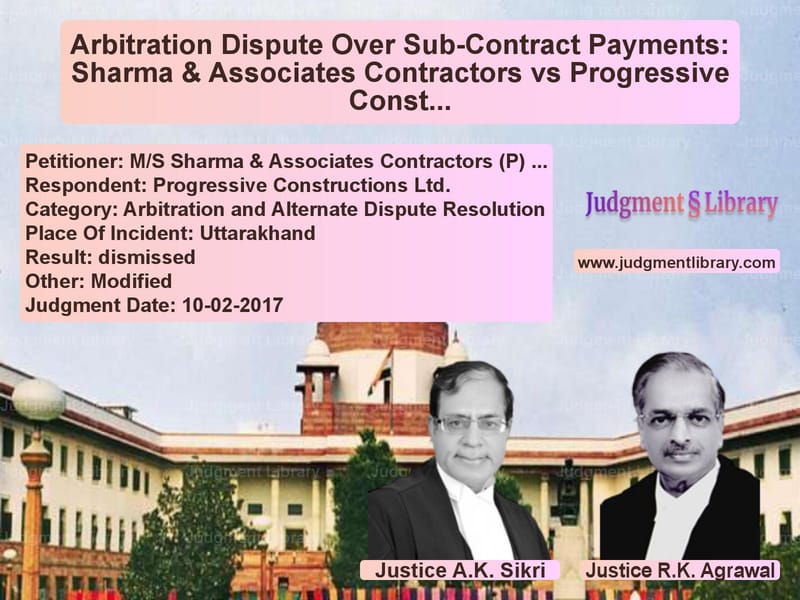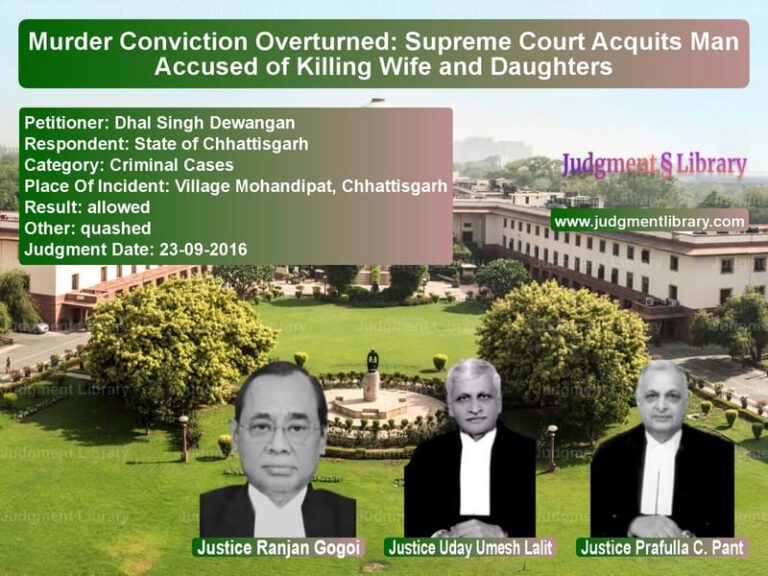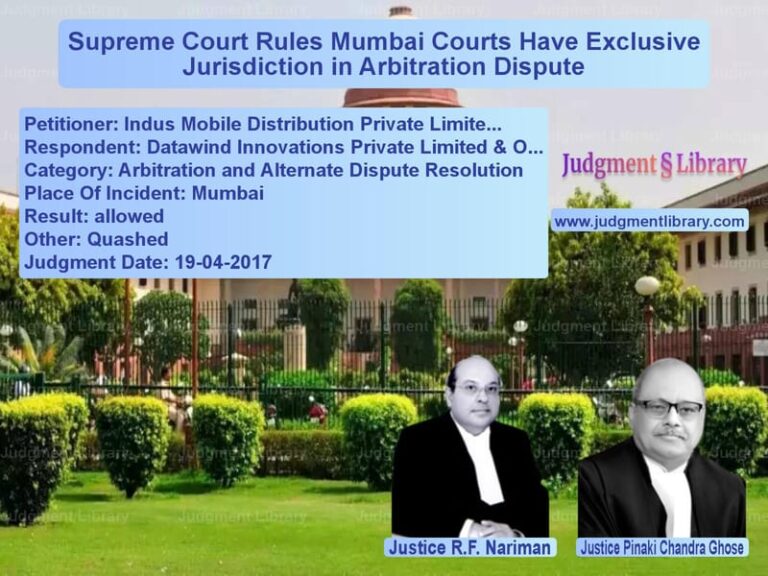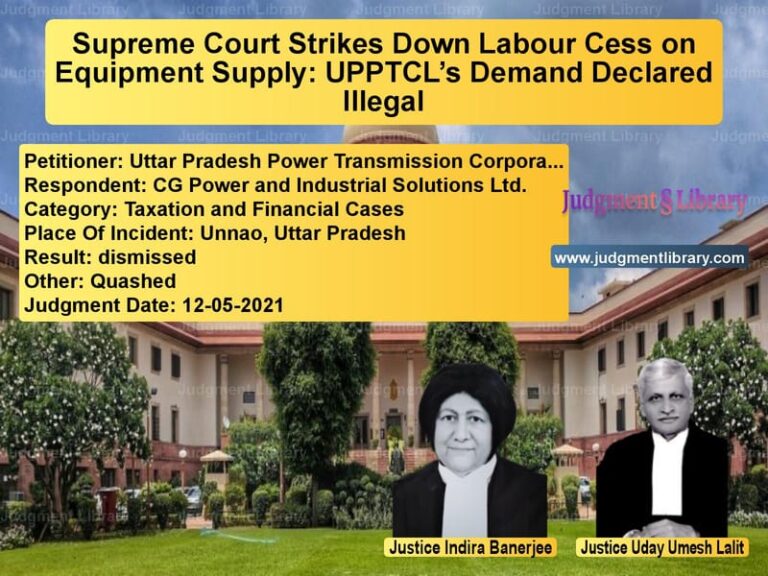Arbitration Dispute Over Sub-Contract Payments: Sharma & Associates Contractors vs Progressive Constructions
The case of M/S Sharma & Associates Contractors (P) Ltd. vs Progressive Constructions Ltd. revolves around an arbitration dispute related to sub-contract payments in the construction sector. The Supreme Court had to determine whether the appellant was entitled to additional payments due to revised rates received by the respondent and whether the arbitrator had acted within jurisdiction in awarding compensation to the appellant.
Background of the Case
The case arose from a construction project awarded by the National Hydro-Electric Power Corporation Ltd. (NHPC) for the construction of a left-side Afflux Bund as part of the Tanakpur Hydro-Electric Project in Nainital, Uttar Pradesh (now Uttarakhand). The contract was initially awarded to Hindustan Steel Works Construction Ltd. (HSCL) on January 28, 1986. HSCL then sub-contracted the work to Progressive Construction Ltd. (PCL) on July 16, 1991.
However, before PCL was formally awarded the sub-contract, it had entered into another agreement with Sharma & Associates Contractors (SAPL) on February 9, 1990, which was later formalized on April 15, 1992. The dispute arose between SAPL and PCL over non-payment of additional sums that SAPL claimed it was entitled to based on revised rates received by PCL from HSCL.
Legal Issues Before the Court
- Whether the revised rates obtained by PCL from HSCL should be passed on to SAPL under a “back-to-back” contract arrangement.
- Whether the arbitrator had jurisdiction to award compensation based on contractual terms between HSCL and PCL rather than between PCL and SAPL.
- Whether the arbitration award was legally valid or constituted a jurisdictional error.
Arguments by the Petitioner (Sharma & Associates Contractors)
- The appellant claimed that since PCL had received revised rates from HSCL, it was legally and contractually obliged to pass on the benefits to SAPL.
- The appellant contended that the contract between SAPL and PCL was a “back-to-back” contract, meaning that any financial benefit obtained by PCL should have been extended to SAPL.
- The arbitrator had correctly determined that SAPL was entitled to an additional amount of Rs. 19,38,357/- based on the revised rates.
Arguments by the Respondent (Progressive Constructions Ltd.)
- The respondent argued that the contract between PCL and SAPL was an independent contract and did not have any provisions mandating the passing of benefits from HSCL.
- The principle of incorporation of contract terms did not apply, and the arbitrator had overstepped jurisdiction by relying on the agreement between HSCL and PCL instead of focusing solely on the contract between PCL and SAPL.
- The High Court had correctly ruled that SAPL was only entitled to escalation payments as per Clause 16 of the contract, amounting to Rs. 7,17,560/-.
Supreme Court’s Observations
The Supreme Court carefully examined the facts and legal arguments. It made the following key observations:
- The contract between NHPC and HSCL permitted sub-contracting, which was then extended to PCL.
- However, the contract between PCL and SAPL did not include a provision for “back-to-back” financial benefits.
- The arbitrator had relied on the agreement between HSCL and PCL instead of the contract between PCL and SAPL, which constituted a jurisdictional error.
- The High Court correctly determined that the appellant was only entitled to escalation payments under Clause 16 of the contract.
The Supreme Court stated:
“Since that was the basis on which the learned arbitrator awarded the claim, the High Court has rightly held that it is a fundamental error committed by the arbitrator.”
Final Judgment by the Supreme Court
The Supreme Court ruled:
- The appeal was dismissed as SAPL was not entitled to additional compensation beyond escalation payments.
- The arbitrator had exceeded jurisdiction by incorporating contractual terms that were not applicable to SAPL.
- The High Court’s ruling that SAPL was entitled to only Rs. 7,17,560/- under Clause 16 of the contract was upheld.
The Supreme Court concluded:
“We are conscious of the fact that though the respondent has been able to get the benefit of enhanced rate in respect of Item Nos.1 and 6 and is able to retain the same thereby depriving the appellant to get this benefit. However, in a matter of contract where the parties have to stick to govern by the provisions of the contract entered into between them, equity has no role to play.”
Analysis of the Judgment
The judgment highlights several key principles in arbitration and contract law:
- Principle of Incorporation: Contractual terms from a higher-tier contract do not automatically apply to a sub-contract unless explicitly stated.
- Jurisdiction of Arbitrators: Arbitrators must operate within the limits of the contract between the disputing parties and cannot impose external contractual obligations.
- Contractual Autonomy: Parties to a contract must abide by their agreed terms, and courts will not modify contracts based on equity or fairness.
Conclusion
The ruling in M/S Sharma & Associates Contractors (P) Ltd. vs Progressive Constructions Ltd. reinforces the principle that arbitration awards must strictly adhere to the contractual terms between the disputing parties. The Supreme Court’s decision ensures that arbitrators do not overstep their jurisdiction and that contractual obligations remain clear and enforceable.
Don’t miss out on the full details! Download the complete judgment in PDF format below and gain valuable insights instantly!
Download Judgment: MS Sharma & Associa vs Progressive Construc Supreme Court of India Judgment Dated 10-02-2017.pdf
Direct Downlaod Judgment: Direct downlaod this Judgment
See all petitions in Arbitration Awards
See all petitions in Contract Disputes
See all petitions in Dispute Resolution Mechanisms
See all petitions in Judgment by A.K. Sikri
See all petitions in Judgment by R K Agrawal
See all petitions in dismissed
See all petitions in Modified
See all petitions in supreme court of India judgments February 2017
See all petitions in 2017 judgments
See all posts in Arbitration and Alternate Dispute Resolution Category
See all allowed petitions in Arbitration and Alternate Dispute Resolution Category
See all Dismissed petitions in Arbitration and Alternate Dispute Resolution Category
See all partially allowed petitions in Arbitration and Alternate Dispute Resolution Category







